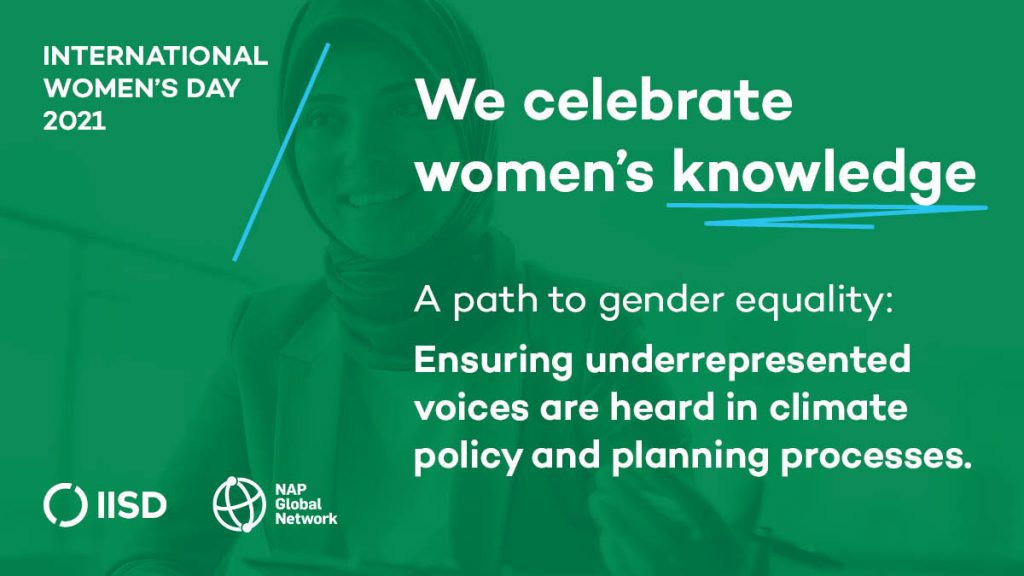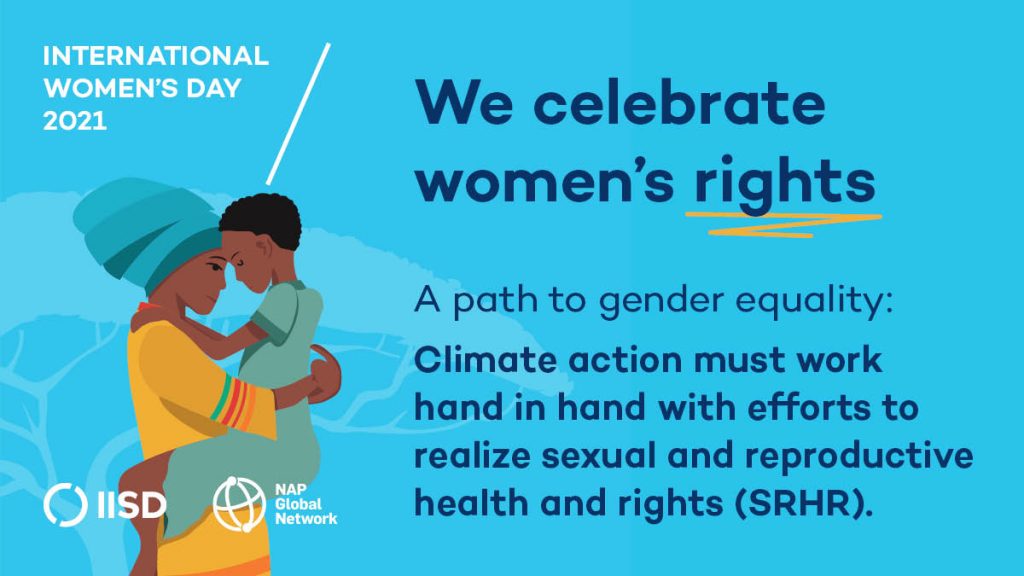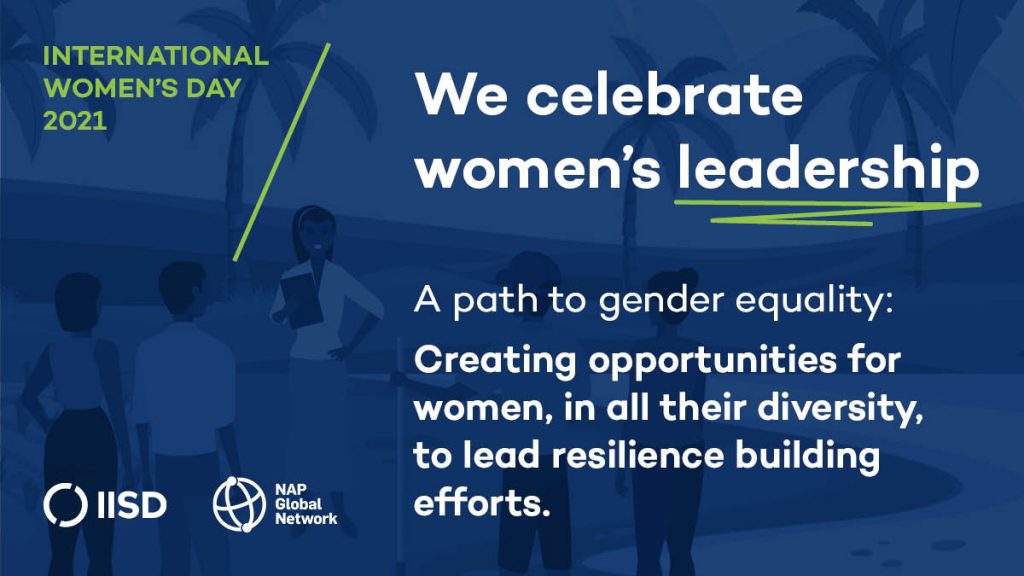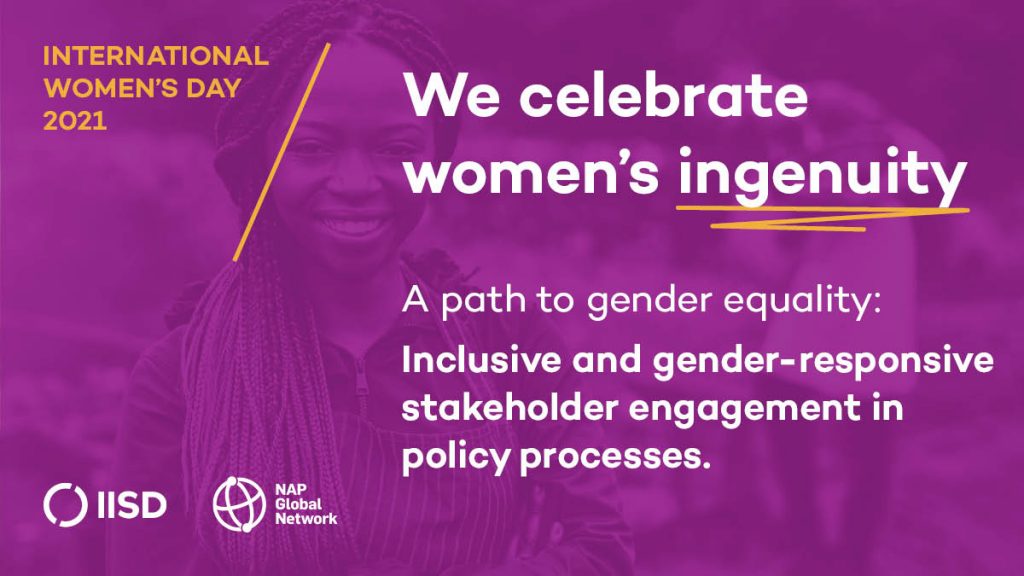This International Women’s Day, we celebrate women in all their diversity and take a step back to remind ourselves of the necessary path to a more just, inclusive, and equal world. At the same time, we must not be blind to the smaller gaps that need filling to ensure this path is solid and sustainable. Today isn’t the only day—it’s just another day—to actively work toward accelerating action on gender equality within our professional fields, communities, and even families.
As advocates for gender equality, our colleagues at the International Institute for Sustainable Development (IISD), Secretariat to the NAP Global Network, actively work with governments and other actors around the world to ensure gender issues are considered in local and national development policies and investments. Highlighted below are a few examples of the work and resources available to support women’s rights, talents, leadership, and ingenuity in climate action.
Women’s Knowledge
Due to gender roles in society, traditional perceptions, social norms, and cultural practices, the consequences of climate change affect men, women, and non-binary people differently. Despite this, climate policies and plans are often developed without meaningful participation of women, particularly those who face other forms of discrimination. This means that essential knowledge is left out, leading to less effective action.
The National Adaptation Plan (NAP) process can be used to actively engage those whose voices are not always heard in government policymaking, to ensure that women’s knowledge is valued and applied to the challenges posed by climate change, for action that is more sustainable and just.
To further understand what government representatives and key stakeholders in NAP processes can do to ensure adaptation policies and projects enhance gender equality, consider watching our virtual learning session, browsing our toolkit, or exploring our synthesis report!
Women’s Rights
Often highlighted in news stories or political debates, the realization of sexual and reproductive health and rights (SRHR) is an ongoing fight in most countries. Connected to many aspects of a woman’s life, SRHR impacts access to education, health resources and services, and overall safety from gender-based violence. What is lesser-known is how these effects can be exacerbated by climate change, and vice-versa.
The NAP process offers opportunities to align a country’s adaptation priorities with the realization of SRHR—building resilience to climate change while protecting women’s rights. Read our SRHR in NAP Processes report to learn more.
Women’s Leadership
Communities in least developed countries and Small Island Developing States have fewer resources available to handle the increasing risks caused by climate change. This makes it even more difficult to build climate-resilient economies, ecosystems, and societies while providing equal opportunities to women, men, and non-binary people. Finding ways to encourage women to be leaders in their own communities, which in turn allows for the empowerment of others, can initiate a path to equality.
Read our interview with Jamaican climate activist Jhannel C. Tomlinson to learn how she spreads sustainable agricultural practices while fighting for gender equality by creating platforms for the women in her community to be leaders.
Women’s Ingenuity
Businesses can create goods and services that support adaptation. They can also provide first-hand knowledge of how climate change affects their communities. These are just two reasons as to why governments have recognized the private sector as a key stakeholder in NAP processes. However, if governments fail to use a gender-responsive approach when engaging with businesses, gender-related barriers within the private sector will continue to restrict women’s access to the decision-making processes and financial resources needed to invest in adaptation.
Following these five steps provided by the NAP Global Network will ensure private sector engagements in NAP processes are effective in employing a gender perspective and promoting gender equality.
We will need continuous efforts in shaping a future that ensures equality for all while adapting to the effects of climate change. For the NAP Global Network, the next step on this path was announced this morning : initiating a partnership with Lensational to amplify the voices of underrepresented women in adaptation planning processes in through photography and storytelling.
We all have a role to play in the fight for gender equality, explore the resources on our theme page to find out how we can help you with yours.



